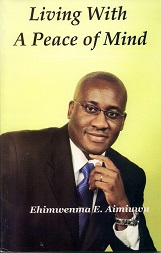 |
|
HAVING
observed that even in the current epoch already christened the 'African Millennium',
more Nigerians are being alienated from their indigenous culture, scholars at
the Second Convocation and Investiture ceremony of the Nigerian Academy of Letters
(NAL), have renewed call for a reversal of order in favor of African's authentic
values and cultural heritage. Held penultimate Thursday at the Nigerian Institute
of International Affairs, Kofo Abayomi Street, Victoria Island, Lagos, Professor
Emeritus, Adeboye Babalola hinges the emergence of a new Nigerian nation on
a return to the roots by concentrating on the use of indigenous languages to
educate the youths. In a lecture entitled: African Renaissance: Making the new
culture grow well out of the old, Prof. Babalola however, did not see any harm
in borrowing from the culture of other peoples, particularly the decent ones.
But he decried wholesome adoption of foreign customs and traditions at the expense
of indigenous values.
The renowned scholar buttressed Professor Adele
Jinadu's views by describing "African Renaissance as the clarion call of an
intellectual and cultural movement whose objective is African rebirth or renewal.
This is also characterized by the entrenchment of African cultural values among
African peoples as against foreign ones", he said emphasizing that "it is a
social, psychological and political process."
The guest lecturer reiterated that the renaissance
would be meaningless, except attention is paid to Dr. Chinweizu's submission
that "African Renaissance is a call by Black African intellectuals for a renewal
of Black African civilization which originally lasted from 6000 B.C to 600 A.D
in many states in Africa, notably Egypt (Kemel), Kush, Axum, Zulu, Benin, Ashanti
and Mali. The glories of that civilization should now inspire present-day Black
Africans to achieve a repeat in the new circumstances". Also explaining that
renaissance is all about transformation, Babalola advocated blend of the old
with the new culture as the process does not only support the fact that culture
is dynamic, it also conforms with the axiom that African communities in the
process of regeneration, have to imbibe certain new ideas, new values, which
will lead to the desired transformation.
A few of these new values, according to him,
relate to science and technology, political organizations, religion and attitude
to chronometric time. The tone of the lecture of course, dramatically
changed
|
|
The Political & Spiritual Purpose of the
Holy Land
 |
| |
|
when the scholar of Yoruba Studies picked Nigeria
as a case study. He lamented the damage done by the wholesome adoption of
Western languages as means of communication and interpersonal relationship at
the expense of the mother tongues. While admitting the indispensability of
English language to cohesion in the polity, he emphasized that "Nigerian
languages are our mother tongues. To every right-thinking Nigerian, the mother
tongue should be a personal possession of great importance to which he or she
has a strong and deeply-felt loyalty as it gives him/her emotional roots in the
community of speakers of the language."
The Obafemi Awolowo University (OAU) Ile Ife-based
Professor stated that the mother tongue is not only the vehicle of communal
tradition and acculturation, but also the medium through which boys and girls
as children become members of their own community and through which adults (men
and women) happily retain their membership of the community. Calling for the
reversal of trend whereby the use of local languages is no longer fashionable,
Prof. Babalola warned that "a people severed from their roots are people deprived
of the sap and vigo of self-confidence; orphans who must wear someone else's
culture even though it fails to fit". He urged urgent implementation of the
National Policy on Education as well as National Cultural Policy launched in
1988 during the Babangida administration noting that both policies give adequate
recognition to the promotion and perpetuation of people's culture and especially,
language in process of education. The professor also condemned the relegation
of local languages at nursery and primary levels of education, saying "it is
alarming that considerable proportion of Nigerian children and youths are abandoning
their mother tongues in favour of exclusive concentration on English, the language
through which education at the secondary and higher levels is available.
"In our cities and large towns, proprietors and
proprietresses of nursery schools and nursery/primary schools are allowed to
get away with 'murder', as it were, through their virtual neglect of African
culture in curricular, co-curricular and extra-curricular activities in their
schools", remarked Babalola. On tradition and modernization in Nigerian culture,
Prof. Babalola said: "For the new culture to grow well out of the old, we must
get our bearings right and act in conformity with the implication of the caveat
that a nation worth its salt aims at retaining those unique qualities which
set its people apart from the people of other countries and also aims at resisting
any corrupting influence of foreign thought and customs."
|
|
|
|
Babalola is however,
worried that the cry of being marginalized by virtually every ethnic group in
the country could constitute hindrance in the march towards greatness. As a
panacea, the scholar wants federal government to re-consider the call for the
restructuring of the Nigerian polity along the lines mutually agreed by a pan-Nigeria
body of representatives of the component parts. When this is done, Babalola
is optimistic that "there would be millions of men and women behaving in truth
and in deed, as patriots or nationalists willing to sacrifice themselves for
Nigeria. As if canvassing support for the Federal government's national rebirth
crusade, he urged Nigerians to shun the culture of impatience; mere love of
having children without thinking on adequate provision for their proper bringing;
casual attitude to work and productivity; spendthrift inclination due to love
of celebration with ostentation; lack of respect for time as well as giving
and receiving of gifts in connection with the granting of favors while cooperativeness
in the giving of mutual help, hospitality and self-reliance should be embraced
meticulously.
The focus of the lecture was earlier set by Professor
Ayo Bamgbose, NAL out-going president who, in his welcome speech, described
African Renaissance as "a rediscovery of ourselves, liberation and popular rule,
elimination of poverty, debt relief and interdependence." Bamgbose explained
further that the Africanness of an African lies basically in his or her culture.
Corroborating Prof. Babalola, Bamgbose said: "Basic to our culture is our language
which is not only an integral of people's heritage but also a maker of identity
in the sense that it represents what is peculiar to a people and its culture."
Added to language, Bamgbose said "are our customs, philosophy of life and tradition
meant to be cherished. Admittedly, culture is not static and we must allow for
socio-cultural, economic and political impact on our traditional culture," he
warned that dynamism of culture should not be misconstrued as abandonment of
intrinsic values.
Relating the thrust of the lecture to the Poverty
Alleviation Program of the present administration, Bamgbose said the program
should manifest not only in the provision of jobs but in the availability of
basic amenities both in urban and rural areas. Specifically, the NAL president
hinged the Nigeria's vision of an African renaissance on upholding of human
dignity and human rights; fostering of true democracy, strong and virile economy;
even development and distribution of resources; safeguarding of Nigeria culture
and enhancement of Nigeria's position in the world among others. Also, the occasion
featured the installation of Professor Emeritus Adeboye Babalola as foundation
fellow of NAL; Professor Emeritus Ladipo Ayo Banjo and Professor Emeritus Tekena
N. Tamuno as new fellows while the trio of Mr. Micheal Angulu, Chief Aigboje
Higo and Mr. Gamaliel Onosode became honorary fellows.
Onosode who spoke on behalf of the recipients pledged
the support of his colleagues to the promotion of the liberal arts which has
been the focus of NAL. The occasion climaxed with the installation of Professor
Ayo Banjo as the new president of the organisation. An autonomous, scholarly
and non-political body, the Nigerian Academy of Letters was inaugurated at a
meeting held at the University of Ibadan on November 14, 1991 as an apex organisation
of Nigerian academics and scholars in the humanities to promote, maintain and
encourage excellence in all branches of humanistic studies. The meeting was
convened by the Deans of Arts of Nigerian universities. But the Academy owes
its origin to the Report of the Public Service Review Panel (otherwise known
as the Udoji report) of 1974 which, in section 641, recommended the creation
of a National Academy of Arts and Sciences.
Although the panel had recommended a single Academy
for the Arts and Sciences, the government opted for a number of academies based
on specific well-known bodies of disciplines. Thus, apart from apex
organizations
in Medicine and Agriculture, the government has already approved the creation
of the Academy of Science, the Academy of Education, and the Council of the
Social Sciences, and provided for them some financial support. The creation
of the Nigerian Academy of Letters therefore represent another stage in the
implementation of the Udoji report and is intended to cater for a very important
body of disciplines of vital importance to the development and retirement of
Nigerian society.
Among the objectives of the academy are: to create
a national forum for the co-ordination of efforts of learned societies in the
area of the arts; to promote scholarship at the highest levels in this area;
to influence at different levels of the national life, the formulation of policies
affecting the development of the Arts; and to cooperate with similar bodies
in the promotion of overall national interests. Others are to encourage and
undertake various publications, including books, monographs, journals, bulletins
and newsletters in addition to the encouragement of general development of the
creative arts as well as undertaking of activities which promote the broad objectives
of the Academy without discrimination on grounds of sex or creed.
|
![]()